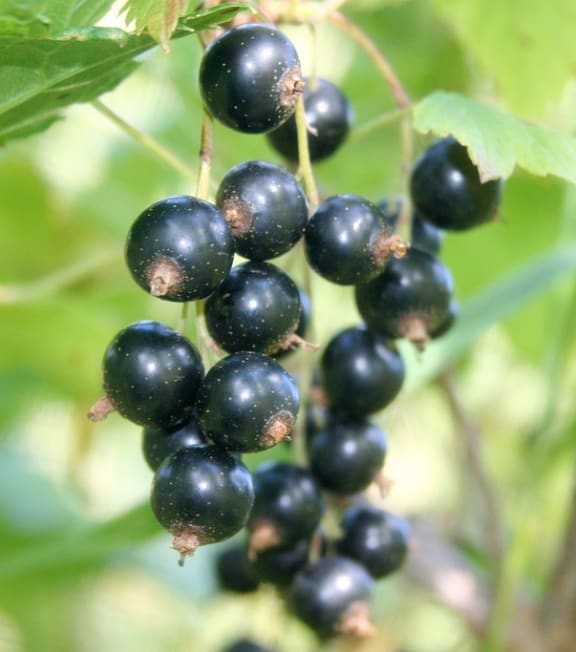By Alison Ballance
“We design foods, or mixtures of food, that have an appreciable effect on mood or cognition. The two main targets were around learning and memory, and anxiety, sleep and stress. We want to find something that can relax people to a degree, without making them stupid. And that’s actually quite a challenge.”
Arjan Scheepens, Neuroscientist, Plant and Food Research.

A cultivar of blackcurrant bred in New Zealand by Plant and Food Research has potential to be a functional food ingredient to support brain health or manage the symptoms of disorders like Parkinson’s disease. Photo: CC BY 2.0
The Mood Food research programme, run by Plant and Food Research has spent the last few years trying to identify food that has a proven health benefit. And they’ve recently announced a success – blackcurrants. Their research has shown that New Zealand-grown blackcurrants not only increase mental performance, but also reduce the activity of monoamine oxidases.
“We specifically were looking for things that inhibit enzymes called monoamine oxidases. As their name suggests they oxidise mono-amines, and mono-amines are things like dopamine, serotonin and noradrenalin. These are really important neuro-transmitters … they’re the good guys and more is generally better than less.”
Neuroscientist Arjan Scheepens says that serotonin is involved in depression, while dopamine is involved partly in depression and anxiety, but also in movement disorders such as Parkinsons.
“If you can inhibit the enzyme that removes dopamine, then you should have higher dopamine levels and this should be of benefit to people who don’t have enough.”
Previous research carried out in the lab had showed that compounds found in some berryfruits may act like monoamine oxidase inhibitors. The latest research tested the effects of blackcurrant consumption on adults – as it was a food, not a new drug, it was very easy to carry out these clinical trials.
Participants in the study were 36 healthy adults aged between 18 and 35 years. They consumed a 250ml drink prior to conducting a set of demanding mental performance assessments. The participants consumed either a sugar and taste-matched placebo (no blackcurrant), an anthocyanin-enriched New Zealand blackcurrant extract (Delcyan™ from the company Just the Berries) or a cold-pressed juice from the New Zealand blackcurrant cultivar ‘Blackadder’, bred by Plant & Food Research. The assessments showed that after consuming the Delcyan™ and ‘Blackadder’ drinks, attention and mood were improved while mental fatigue was reduced. In addition, blood tests showed that the activity of the monoamine oxidase enzymes (MAO) was strongly decreased after consuming the ‘Blackadder’ juice, indicating the potential for compounds found in ‘Blackadder’ blackcurrants as a functional food ingredient to support brain health or managing the symptoms of disorders like Parkinson’s disease.

Arjan Scheepens is a neuroscientist working at Plant and Food Research. Photo: Plant and Food Research
Research results have been published in the Journal of Functional Foods: “Acute supplementation with blackcurrant extracts modulates cognitive functioning and inhibits monoamine oxidase-B in healthy young adults.”
Before you rush out in search of the products mentioned, Plant and Food Research say they are not aware of any products on the market containing only juice from the New Zealand cultivar 'Blackadder'. Blackadder is a commercial cultivar is not currently available to the home gardener.
Plant & Food Research also say they have only analysed the cultivar 'Blackadder' for its effect on cognition in healthy young people - although it is possible that other varieties may have a similar effect this has never been scientifically tested. They have not tested the effects of 'Blackadder', or any other blackcurrant variety, in people with cognition or mood disorders, such as Parkinson’s, depression or anxiety, and are not able to comment on potential effects.

